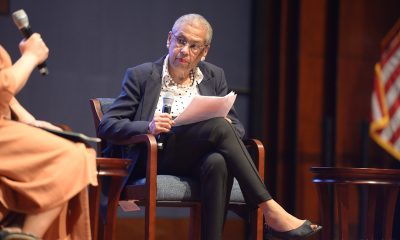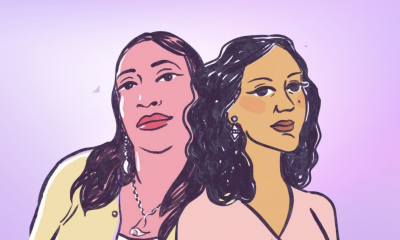Local
Virginia set to approve anti-gay adoption bill
White House expresses reservations over ‘discriminatory’ policies

Republican Gov. Robert McDonnell has said he plans to sign the anti-gay adoption bill if it reaches his desk. (photo by Gage Skidmore via Wikimedia commons)
Strong objections by LGBT rights advocates and reservations expressed by a White House spokesperson were brushed aside by the Virginia Legislature this week as it cleared for approval a bill that allows state-funded agencies to deny adoptions based on religious or “moral” grounds.
State Sen. Adam Ebbin (D-Alexandria), who is gay, said that although the words “sexual orientation” and “gay” or “lesbian” are not in Senate Bill 349, lawmakers clearly understand that it’s aimed at justifying the denial of adoptions or foster child placement for gay people.
Supporters dubbed the measure the “conscience clause” bill, saying it would allow faith-based adoption agencies to exercise their conscience in deciding whether granting an adoption for certain individuals would violate their religious or moral beliefs.
“This would put into the law that they can be turned away,” Ebbin said in discussing potential gay or lesbian adoptive parents “The issue is simple – whether or not state dollars should be used or taxpayers’ funds should be used to fund discrimination in adoption and foster care.”
The Republican-controlled Virginia House of Delegates voted 71-28 last week to approve the bill. A Senate committee approved the measure on Feb. 3, and the full Senate, which is also controlled by Republicans, was expected to approve the bill on Thursday.
Republican Gov. Robert McDonnell has said he plans to sign the bill if it reaches his desk.
The “conscience clause” adoption measure, introduced by Sen. Jeffrey McWaters (R-Virginia Beach), doesn’t ban gay people from adopting or becoming foster parents. Ebbin and others familiar with the bill said it would not change existing state law that allows private agencies to approve gay adoptions and gay foster care placement if they wish to do so.
The legislation instead provides a state seal of approval to state-funded agencies that refuse to approve adoptions and foster care placement to a gay person or to other individuals based on religious or moral grounds, Ebbin said.
White House spokesperson Shin Inouye, when asked about the adoption measure by the Washington Blade, said President Obama believes adoption placement shouldn’t be based on discrimination.
“Although the president does not weigh in on every single action taken by legislative bodies in our country, he has long believed that we must ensure adoption rights for all couples and individuals based on their interest in offering a loving home, not based on discriminatory and irrelevant factors,” Inouye said.
“He recognizes that adoptive families come in many forms, and that we must do all we can to break down barriers to ensure that all qualified caregivers have the ability to serve as adoptive families,” Inouye said.
As the “conscience clause” adoption bill was placed on a fast track for approval, separate bills that would ban job discrimination against state employees and ban adoption-related discrimination based on sexual orientation or gender identity died in committee in the Virginia Senate last week. Ebbin was among the lead sponsors of both bills.
On Feb. 1, one day before the Senate Committee on Rehabilitation and Social Services approved the conscience clause bill, it rejected an adoption non-discrimination bill that Ebbin introduced.
Ebbin’s bill called for banning discrimination in adoption and foster care placement based on a list of categories, including sexual orientation and gender identity.
Two days earlier, the Virginia Senate’s Committee on General Laws and Technology voted 8-7 along party lines to defeat an employment non-discrimination bill that Ebbin and Sen. Donald McEachin (D-Henrico County) introduced.
Senate Bill 263 called for protecting state employees from discrimination based on their sexual orientation or gender identity.
A similar bill introduced in the Virginia Senate passed in committee and in the full Senate in 2010 and 2011 when the Senate was controlled by Democrats. It died both years in the House of Delegates, which was Republican controlled.
Democrats lost control of the Senate in the November 2011 election, which left the Senate equally divided between Democrats and Republicans. The state’s Republican lieutenant governor, who has authority to cast a tie-breaking vote, effectively placed control of the Senate in the Republicans’ hands.
That enabled Republicans this year to gain an 8-7 majority on the General Laws and Technology Committee, which had jurisdiction over Ebbin’s employment non-discrimination bill.
A report released on Monday by the Williams Institute, a think tank affiliated with the University of Southern California’s Law School, says the conscience clause adoption bill, if enacted, could result in the expenditure of millions of dollars more by the state for its adoption and foster care services.
The report, written by Gary Gates, an expert on U.S. Census data pertaining to gays, estimates that 1,700 adopted children and 300 foster children are currently being raised by single lesbians and gay men in Virginia.
“If this legislation were to pass, families such as these may find it more difficult to serve as adoptive or foster parents, resulting in more children in congregate [state-run] care or more children remaining in foster care for longer periods of time,” the report says. It says the state saves nearly $30,000 per year for each child adopted out of the foster care system, and that savings would be lost if fewer gays were to adopt.
James Parish, executive director of Equality Virginia, a statewide LGBT advocacy group, said the decision by the General Laws and Technology Committee to defeat the employment non-discrimination bill indicates that LGBT people are being treated as “second-class citizens in Virginia.
“Virginia is one of only 20 states where you can still be fired from a state or local job simply because of your sexual orientation or gender identity,” he said.
“The reality undercuts the Commonwealth’s ability to recruit the best and the brightest to be our college professors, our teachers and our other public employees,” he said.
Maryland
Expanded PrEP access among FreeState Justice’s 2026 legislative priorities
Maryland General Assembly opened on Jan. 14
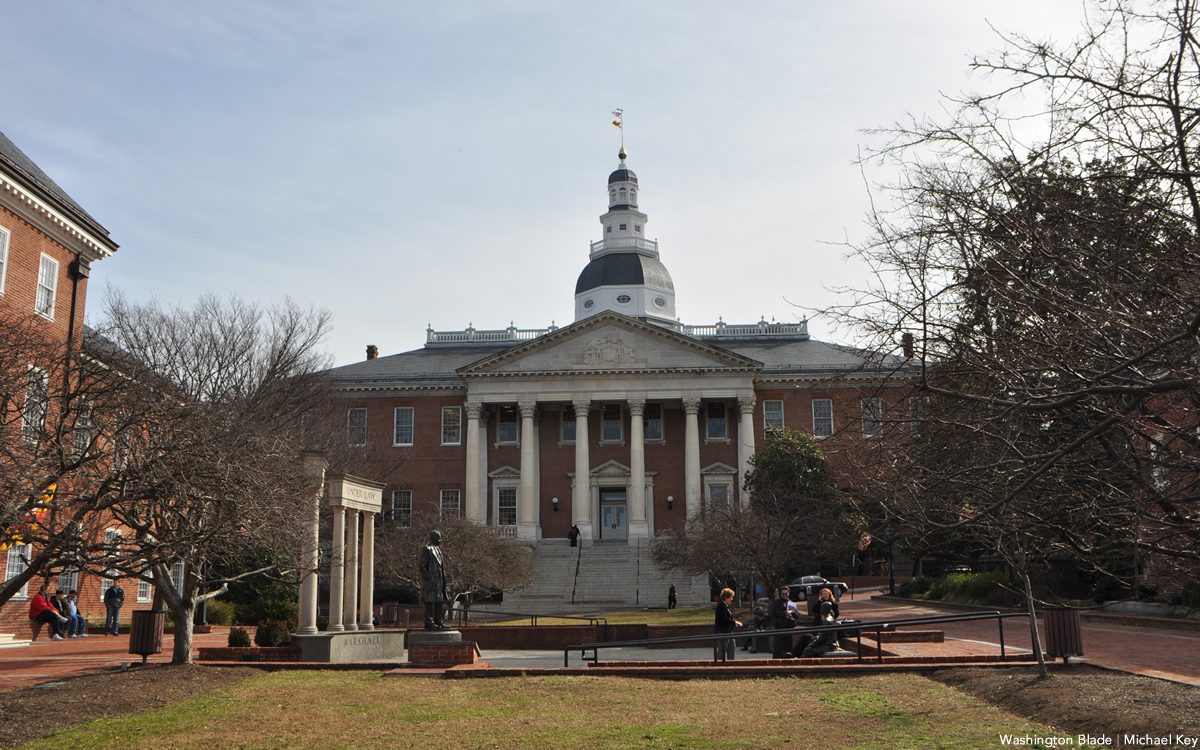
FreeState Justice this week spoke with the Washington Blade about their priorities during this year’s legislative session in Annapolis that began on Jan. 14.
Ronnie L. Taylor, the group’s community director, on Wednesday said the organization continues to fight against discrimination against people with HIV/AIDS. FreeState Justice is specifically championing a bill in the General Assembly that would expand access to PrEP in Maryland.
Taylor said FreeState Justice is working with state Del. Ashanti Martinez (D-Prince George’s County) and state Sen. Clarence Lam (D-Arundel and Howard Counties) on a bill that would expand the “scope of practice for pharmacists in Maryland to distribute PrEP.” The measure does not have a title or a number, but FreeState Justice expects it will have both in the coming weeks.
FreeState Justice has long been involved in the fight to end the criminalization of HIV in the state.
Governor Wes Moore last year signed House Bill 39, which decriminalized HIV in Maryland.
The bill — the Carlton R. Smith Jr. HIV Modernization Act — is named after Carlton Smith, a long-time LGBTQ activist known as the “mayor” of Baltimore’s Mount Vernon neighborhood who died in 2024. FreeState Justice said Marylanders prosecuted under Maryland Health-General Code § 18-601.1 have already seen their convictions expunged.
Taylor said FreeState Justice will continue to “oppose anti anti-LGBTQ legislation” in the General Assembly. Their website later this week will publish a bill tracker.
The General Assembly’s legislative session is expected to end on April 13.
Virginia
From the Pentagon to politics, Bree Fram fighting for LGBTQ rights
Transgender veteran running for Congress in Va.
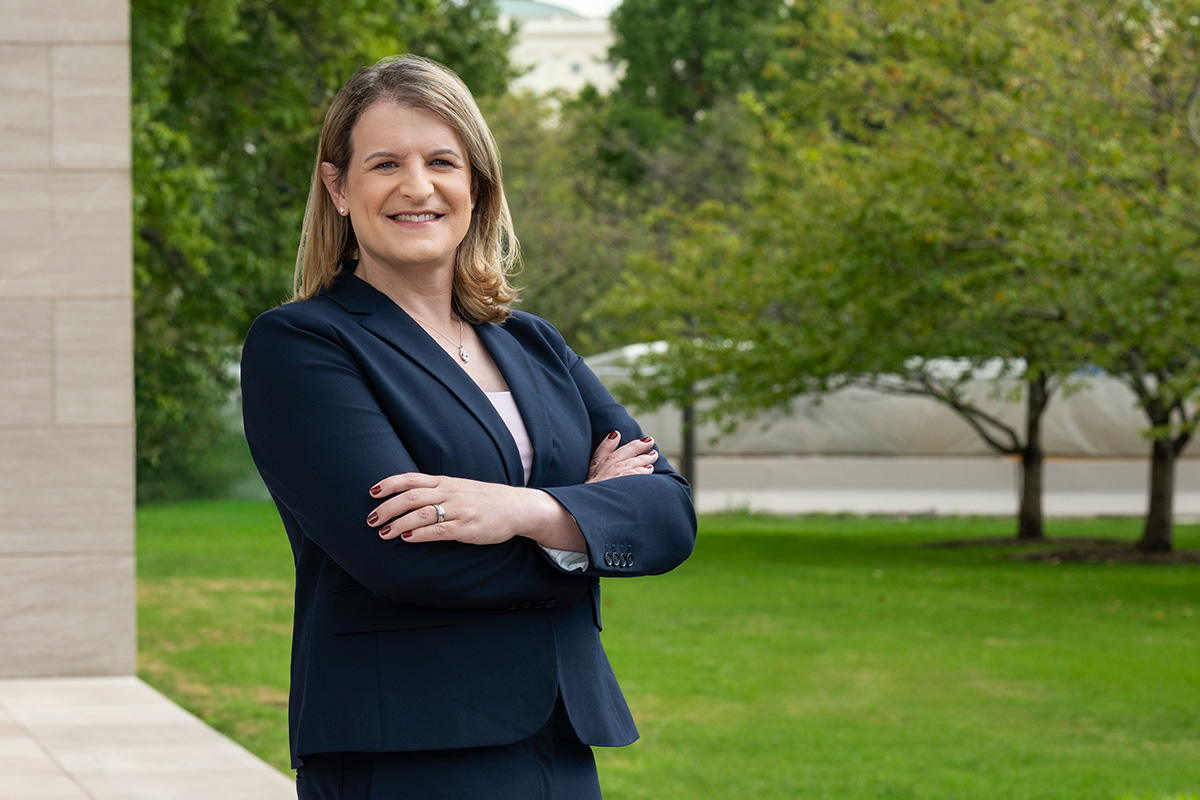
After being ousted from military service, Col. Bree Fram — once the highest-ranking openly transgender officer in the Pentagon — is now running for Congress.
Fram, who lives in Reston, Va., brings more than two decades of public service to her campaign. From the battlefield to the halls of the Pentagon, she spent more than 20 years working inside the federal government, often advocating for LGBTQ people and other marginalized communities from within the system.
Fram spoke with the Washington Blade about her decision to run amid sustained attacks against her — and against the LGBTQ community more broadly — from the Trump-Vance administration and far-right officials.
She said her commitment to public service began more than 22 years ago, shaped in large part by watching the Sept. 11, 2001, terrorist attacks.
“I had grown up expecting that there was this beautiful American peace stretching into the world for the foreseeable future, and that kind of image was shattered,” Fram told the Blade. “I realized that there was a continuous price to be paid to protect our democracy, to protect our freedoms. To be able to play a small part in defending those freedoms was incredibly important to me — to be part of something larger than myself.”
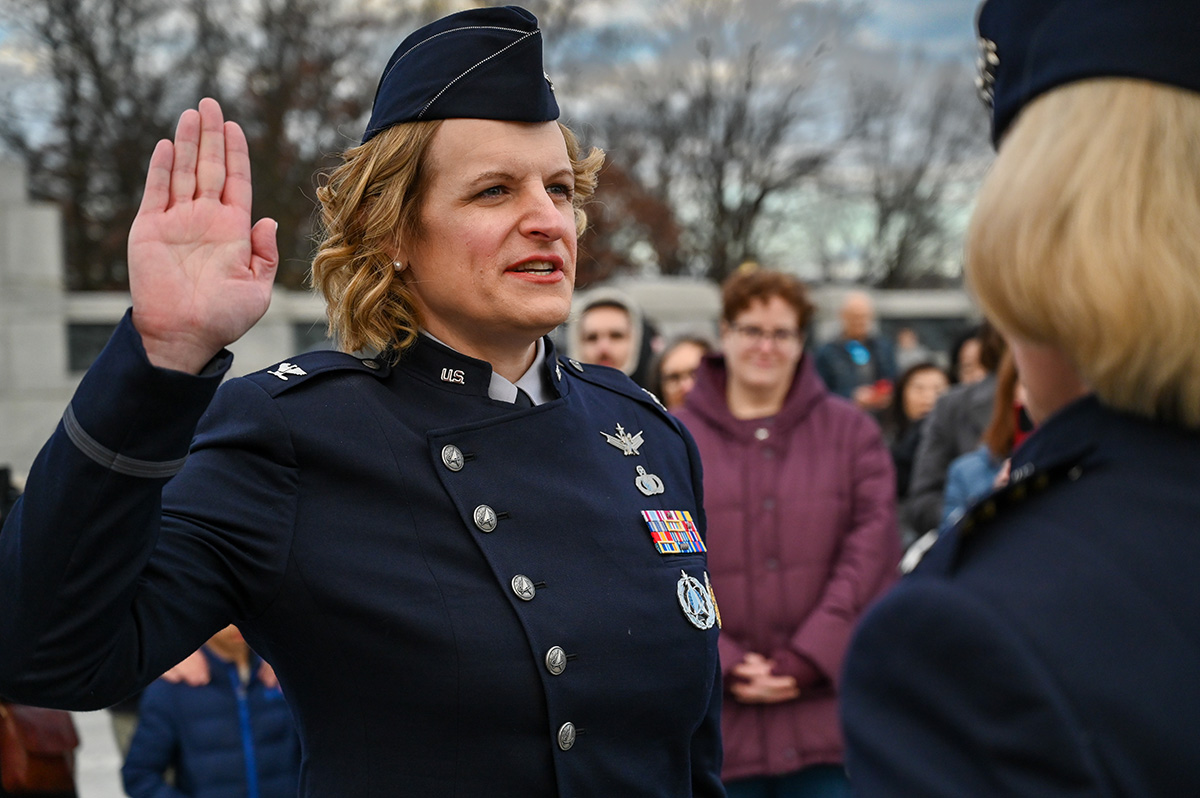
Commissioned through the U.S. Air Force Officer Training School in 2003, Fram served as an astronautical engineer and rose to the rank of colonel in the U.S. Air Force before later serving in the U.S. Space Force. She remained on active duty until 2025, when she was forced out following the Trump-Vance administration’s reinstated ban on trans military service.
Fram has been married for 20 years to her spouse, Peg Fram, and they have two children.
Beyond her military service, Fram has long been involved in advocacy and leadership. She has been a member of SPARTA, a trans military advocacy organization, since 2014, served on its board of directors beginning in 2018, and was president of the organization from 2021-2023.
Most recently, Fram served as chief of the Requirements Integration Division at Headquarters, Space Force, and as co-lead of the Joint Space Requirements Integration Cell in collaboration with the Joint Staff. Previously, she was chief of the Acquisition Policies and Processes Division for the assistant secretary of the Air Force for space acquisition and integration.
Earlier in her career, Fram served as a materiel leader at the Air Force Research Laboratory, overseeing the development of counter-small unmanned aerial systems and offensive cyberspace technologies in support of Pentagon and intelligence community priorities, managing an annual budget exceeding $100 million.
Her previous assignments also included oversight of Air Force security cooperation in four strategically significant Middle Eastern countries and 258 foreign military sales cases valued at $15.79 billion; serving as executive officer to the Air Force director of strategic plans, where she helped integrate the 30-year, $3.6 trillion Air Force Plan; a legislative fellowship on Capitol Hill with then-U.S. Del. Madeleine Bordallo (D-Guam), handling military, veterans, and foreign affairs issues; and a program management role at the National Reconnaissance Office, where she led a $700 million multi-agency engineering and IT contract overseeing more than 500 personnel and supporting $40 billion in assets.
Fram also directed 24/7 worldwide operations and maintenance of mission data processing for space-based and airborne national intelligence assets and co-led the Department of the Air Force’s LGBTQ+ Initiatives Team and Barrier Analysis Working Group from 2023-2025.
She holds a master’s degree from the Air Force Institute of Technology and is a distinguished graduate of the Naval War College. Fram deployed in support of Operation Iraqi Freedom, where she worked on airborne counter-improvised explosive device technologies.
In January, Fram, alongside four other trans military officers, was given a special retirement ceremony by the Human Rights Campaign — a direct result of President Donald Trump’s 2025 Executive Order 14183, titled “Prioritizing Military Excellence and Readiness.” The policy directed the Pentagon to adopt measures prohibiting trans, nonbinary, and gender-nonconforming people from serving in the military.
Under Virginia’s current congressional maps, Fram would challenge Congressman James Walkinshaw in a Democratic primary in the 11th Congressional District, which includes the city of Fairfax and most of Fairfax County. However, the district’s boundaries could change pending ongoing redistricting discussions in the state.
Fram emphasized that her decades working within the executive branch shaped her understanding of what it means to take — and uphold — an oath to the Constitution, even when those in power later forced her out of service solely because of her identity, not her performance.
“Through 23 years of service, I learned what it meant to fulfill that oath to the Constitution, and I wanted to continue serving,” she said. “But when this administration came in and labeled me and others like me ‘dishonorable’ and ‘disciplined liars who lack the humility required for military service,’ it hit hard. When the Supreme Court then agreed to let the administration fire all of us, I had to figure out what would allow me to continue my service in a way that was meaningful and lived up to that oath.”
After being told she would have to retire from a career she describes as her life’s calling, Fram said she began searching for another way to serve — a path that ultimately led her to run for Congress.
“I had done the work over the past couple of decades to understand the America that I believe in, that America I believe we all can be,” Fram said. “That’s where this decision came from. I believe I can fight back and fight forward for Virginians — with the knowledge I have and with a vision of the America we can be.”
That vision, she said, is one that has yet to be fully realized — despite decades of promises from Democratic leaders across all branches of government.
“This is about protecting our fundamental rights — freedom of speech, freedom to assemble, bodily autonomy, a woman’s right to choose, and the ability for queer people to live our best lives,” Fram said. “Right now, our government is throwing barriers up in front of many people. They’re strengthening them, building walls higher, and actively damaging lives.”
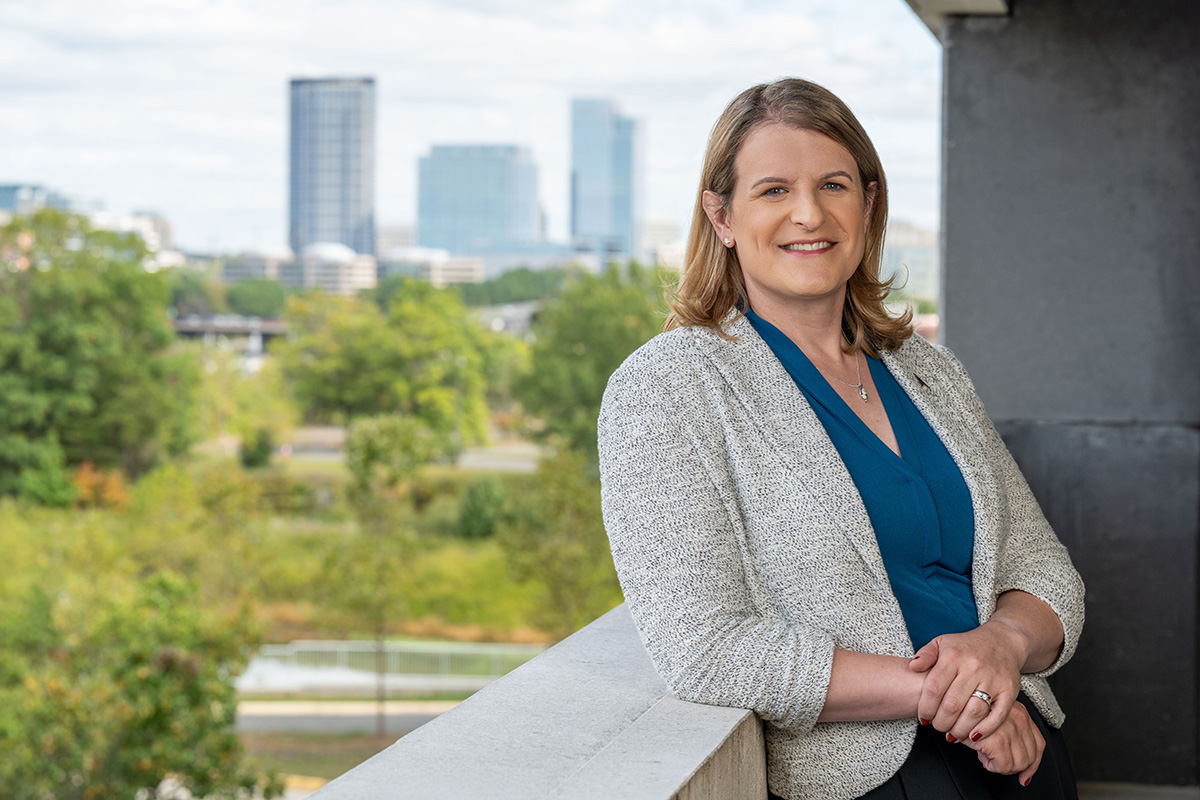
Fram said her leadership philosophy was shaped by watching strong, effective leaders during her time in the Air Force and Space Force — leaders who reinforced her belief that true leadership means expanding opportunity, not restricting it.
“Leadership is about tearing barriers down — not climbing over them and forcing others to suffer through the same things,” she said. “It’s about making sure the people coming up behind us have even more opportunity to go further, faster. How do we be better tomorrow than we are today? How do we fulfill our founding promise of life, liberty, and the pursuit of happiness?”
One way Fram said Congress could help dismantle those barriers is by passing the Equal Rights Amendment, enshrining constitutional protections for all people — particularly LGBTQ Americans.
“Getting the Equal Rights Amendment into the Constitution is absolutely critical to the future of queer rights,” she said. “Voting rights must also be clearly protected.”
Protecting democracy itself is also among her top priorities, Fram said.
“We need to take control of the House so we can put real checks on this administration,” she said. “That allows the American people to see how this administration is actively making their lives worse and less affordable — and it’s how we ultimately throw them out and get back to making life better.”
Fram said her experience working under four presidents — including during Trump’s first term — reinforced her belief that opposition to efforts curtailing civil liberties is essential.
“The primary thing we can do to protect democracy is to get rid of this administration,” she said. “Taking control of the House gives us true investigative power. Under every rock, there is likely an impeachable offense because they are failing to faithfully execute the laws of the United States.”
For her, the message Trump is sending is clear — he and others close-minded to the LGBTQ community are threatened by the possibility of what someone truly dedicated to service can become.
“One of the reasons this administration had to throw us out and silence us was because we were an example of what was possible. We shined so brightly by meeting or exceeding every standard that they couldn’t hide us away by any other means except kicking us out.”
Fram acknowledged that her identity has been a political target since 2016, but said those attacks have never been grounded in her ability to lead or accomplish complex missions over more than two decades of service.
“If others want to attack me on my identity, I welcome it,” she said. “I’m focused on whether people can afford groceries or feel safe in their communities.”
“I’m happy to be a lightning rod for those kinds of attacks,” she added. “If it allows Democrats to advance an agenda that makes life better for Americans, they can come after me all day long. They attacked me while I was in the military, before I was ever running for office.”
On policy, Fram said affordability, health care, and safety are at the center of her agenda.
“No one should be afraid to go to the doctor or fear surprise medical bills that put them into debt,” she said. “Every American deserves access to affordable, high-quality health care.”
She also emphasized a willingness to work across party lines — even with those who previously politicized her identity — if it means delivering results for constituents.
“If someone wants to work together to make people’s lives better, I’ll work with them,” she said. “If they want to come after me based on who I am, they can waste their energy on that.”
Asked how she defines hope in the current political moment, Fram rejected the idea of passive optimism.
“Hope isn’t naive optimism,” she said. “Hope is doing the work — engaging people and bending the moral arc of the universe toward justice.”
She added that representation itself can be transformative.
“Just being in Congress changes the narrative,” Fram said. “It lets a kid say, ‘Oh my God — I could do that too.’”
District of Columbia
Eleanor Holmes Norton ends 2026 reelection campaign
Longtime LGBTQ rights supporter introduced, backed LGBTQ-supportive legislation
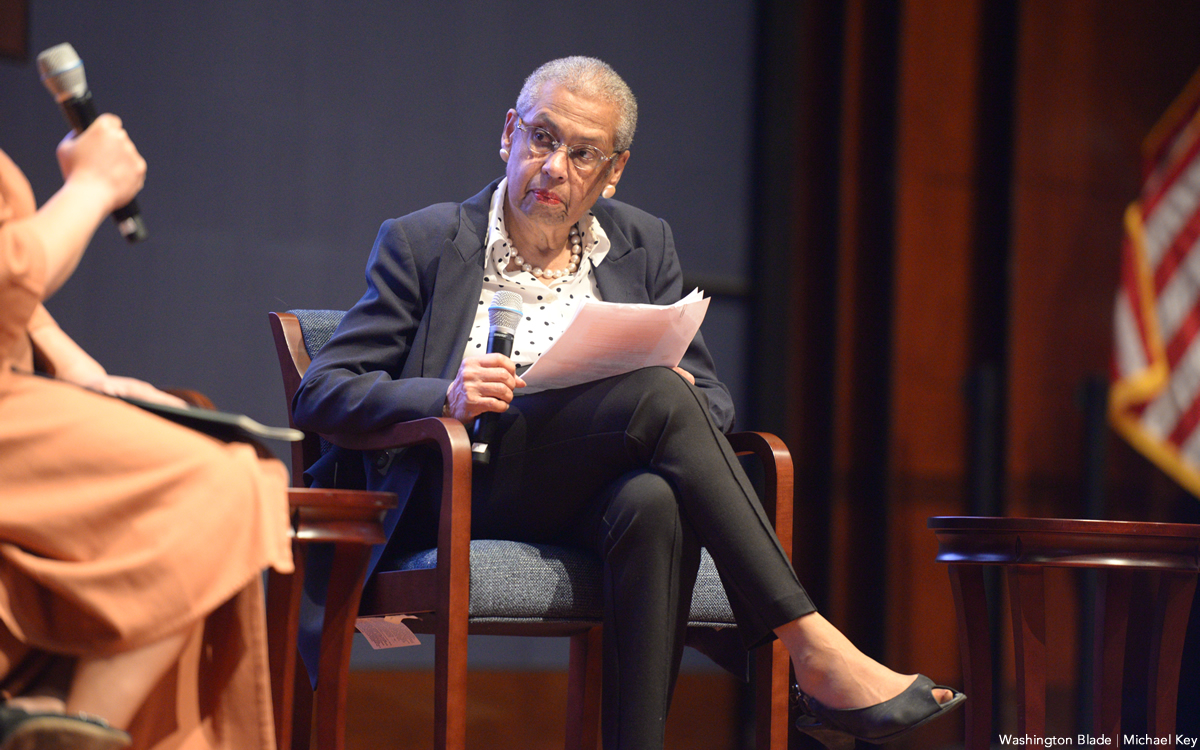
The reelection campaign for D.C. Congressional Delegate Eleanor Holmes Norton, who has been an outspoken supporter of LGBTQ rights since first taking office in 1991, filed a termination report on Jan. 25 with the Federal Elections Commission, indicating she will not run for a 19th term in the U.S. House of Representatives.
Norton’s decision not to run again, which was first reported by the online news publication NOTUS, comes at a time when many of her longtime supporters questioned her ability to continue in office at the age of 88.
NOTUS cited local political observers who pointed out that Norton has in the past year or two curtailed public appearances and, according to critics, has not taken sufficient action to oppose efforts by the Trump-Vance administration and Republican members of Congress to curtail D.C.’s limited home rule government.
Those same critics, however, have praised Norton for her 35-year tenure as the city’s non-voting delegate in the House and as a champion for a wide range of issues of interest to D.C. LGBTQ rights advocates have also praised her longstanding support for LGBTQ rights issues both locally and nationally.
D.C. gay Democratic Party activist Cartwright Moore, who has worked on Norton’s congressional staff from the time she first took office in 1991 until his retirement in 2021, points out that Norton’s role as a staunch LGBTQ ally dates back to the 1970s when she served as head of the New York City Commission on Human Rights.
“The congresswoman is a great person,” Moore told the Washington Blade in recounting his 30 years working on her staff, most recently as senior case worker dealing with local constituent issues.
Norton has been among the lead co-sponsors and outspoken supporters of LGBTQ rights legislation introduced in Congress since first taking office, including the currently pending Equality Act, which would ban employment discrimination based on sexual orientation and gender identity.
She has introduced multiple LGBTQ supportive bills, including her most recent bill introduced in June 2025, the District of Columbia Local Juror Non-Discrimination Act, which would ban D.C. residents from being disqualified from jury service in D.C. Superior Court based on their sexual orientation or gender identity.
For many years, Norton has marched in the city’s annual Pride parade.
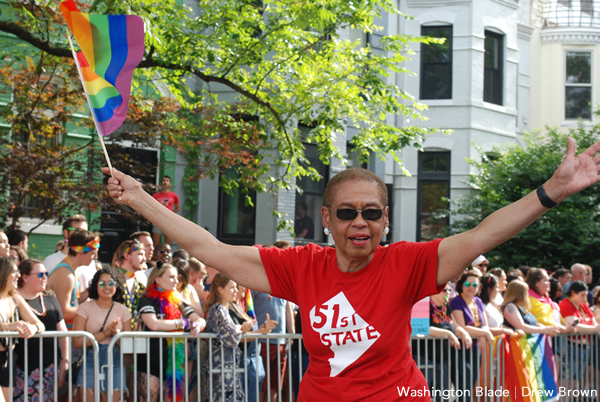
Her decision not to run for another term in office also comes at a time when, for the first time in many years, several prominent candidates emerged to run against her in the June 2026 D.C. Democratic primary. Among them are D.C. Council members Robert White (D-At-Large) and Brooke Pinto (D-Ward 2).
Others who have announced their candidacy for Norton’s seat include Jacque Patterson, president of the D.C. State Board of Education; Kinney Zalesne, a local Democratic party activist; and Trent Holbrook, who until recently served as Norton’s senior legislative counsel.
“For more than three decades, Congresswoman Norton has been Washington, D.C.’s steadfast warrior on Capitol Hill, a relentless advocate for our city’s right to self-determination, full democracy, and statehood,” said Oye Owolewa, the city’s elected U.S. shadow representative in a statement. “At every pivotal moment, she has stood firm on behalf of D.C. residents, never wavering in her pursuit of justice, equity, and meaningful representation for a city too often denied its rightful voice,” he said.
A spokesperson for Norton’s soon-to-close re-election campaign couldn’t immediately be reached for a comment by Norton on her decision not to seek another term in office.
-

 Real Estate4 days ago
Real Estate4 days agoConvert rent check into an automatic investment, Marjorie!
-

 Theater4 days ago
Theater4 days agoSwing actor Thomas Netter covers five principal parts in ‘Clue’
-

 District of Columbia3 days ago
District of Columbia3 days agoEleanor Holmes Norton ends 2026 reelection campaign
-

 Honduras3 days ago
Honduras3 days agoCorte IDH reconoce a Thalía Rodríguez como familia social de Leonela Zelaya



















